
The Socio-Economic Panel (SOEP) is the largest and oldest long-term study investigating social change and the development of living conditions in Germany. infas is commissioned to conduct the surveys.
The SOEP has been conducted since 1984 and is funded by the Federal Ministry of Education and Research (BMBF) and the German states. The panel targets the entire household and all household members who are surveyed annually. The respondents are familiar with the study under the name “Living in Germany. infas is responsible for the implementation of the panel waves, the securing and maintenance of the panel stock, the entire data preparation as well as the preparation of the data report.
Aims of the panel study
The Socio-Economic Panel (SOEP) is the largest and oldest long-term study mapping social change and the development of living conditions in Germany. The SOEP has been collected since 1984 and is funded by the German Federal Ministry of Education and Research (BMBF) and the German states. The population of the survey is the household and all household members in Germany, who are surveyed annually. Respondents know the survey under the name “Life in Germany.” In addition to the panel study, SOEP is equally a research-based infrastructure unit at the German Institute for Economic Research (DIW), Berlin. The SOEP team conducts its own research and prepares the survey data for researchers worldwide. Studies based on the SOEP analyze various aspects of social change and determine, for example, how equally or unequally social resources are distributed. This involves, for example, the distribution of income and wealth or access to education or work and the associated opportunities. In addition, researchers investigate how certain living conditions affect well-being and health and what role personal characteristics play in the course of life. Another focus of SOEP research is the living situation of migrants in Germany.Tasks of infas
infas is responsible for the implementation of the panel waves, the securing and maintenance of the panel stock, the entire data processing as well as the preparation of the data report. The survey is conducted in a mixed-mode design, which combines all current survey modes (CAPI, CASI, CAWI, PAPI, CATI). Method changes on household and on person level will be implemented in the current field. The panel consists of several randomly drawn subsamples that together represent the population of all private households. In order to observe developments and changes over time, the survey was designed as an annual repeat survey and dynamic panel. In addition, the panel is replenished in individual waves by new refresher sample(s). One household interview is implemented in each household. In addition, individual household members who reach at least the age of twelve in the survey year are interviewed independently about themselves. Younger household members are represented by information provided by their caregiver from the household. The interviews will be conducted primarily in German. In addition, the languages Arabic, Bulgarian, English, Farsi, Polish and Romanian are offered. About 22,000 households and more than 30,000 people are interviewed annually.The company survey of the Socio-Economic Panel: Based on the thesis that a person’s working environment is of essential importance for explaining life success, the surveys in the “SOEP-LEE” study pursue the goal of linking personal and company data. Such linked data sets allow, for example, to investigate the influence of organizational structures and processes on social inequality at the individual level. For this purpose, the SOEP-LEE project will survey employers of dependent employees from the SOEP-CORE survey. In addition, a comparative survey of establishments from the IAB Establishment File will be conducted. Topics of these surveys in 2021/22 are, in particular, coping with the Corona pandemic as well as dealing with digitalization and the shortage of skilled workers. In addition, the project also focuses on the self-employed. To this end, a special question module was added to the SOEP-CORE questionnaire for. This study also uses a mixed-mode design with CATI , CAWI, PAPI and CAPI. The questionnaire for the self-employed, which is collected as part of SOEP-CORE, is available in the methods CAPI, CATI, CAWI and CASI.
This project is a collaborative effort between SOEP at the German Institute for Economic Research (DIW), Berlin, and the Institute for Personnel and Work (IPA) at Helmut Schmidt University (HSU).
The Corona Monitoring Study investigated how many people had already been infected with the SARS-CoV- coronavirus without realizing it, how many people had already been vaccinated, and how long antibodies could be detected in the blood. For this purpose, respondents aged 14 years and older were asked to answer a questionnaire (in writing or online) and to self-collected some drops of blood from their finger to determine antibodies against SARS-CoV- (dry blood test). In total, more than 21,000 participants of the Socio-Economic Panel were asked to participate. Participation in the study had to be confirmed in writing on an informed consent form. Participation was self-administered by the respondents. For this purpose, comprehensive study information, notes on data protection and instructions (illustrated and on video) were prepared and sent to the respondents by mail. To enable non-German-speaking respondents to participate in the study, all survey materials and study information were translated into English, Polish, Romanian, Bulgarian, Arabic, and Farsi. During the field period, several written reminders were sent as well as a telephone contact to remind about participation and to answer possible follow-up questions. infas was commissioned to conduct the study by the SOEP at the German Institute for Economic Research (DIW) in cooperation with the Robert Koch Institute (RKI). Further cooperation partners are the Institute for Employment Research (IAB) and the Federal Office for Migration and Refugees (BAMF). Results from the Corona Monitoring can be found on the Internet.
The war in Ukraine triggered a flight movement of people living there. Many of them are also seeking protection in Germany. To learn more about how refugees from Ukraine are faring in Germany and how their situation will develop in the coming months and years, the Institute for Employment Research (IAB), the Federal Institute for Population Research (BiB), the Research Center of the Federal Office for Migration and Refugees (BAMF-FZ), the Socio-Economic Panel (SOEP) at the German Institute for Economic Research (DIW), and the infas Institute for Applied Social Science are jointly conducting the study “IAB-BIB-BAMF-SOEP: Survey of Refugees from Ukraine”.
For the study, a nationwide residents’ registration office sample of people who have moved from Ukraine since the outbreak of war was drawn. For the first survey in summer 2022, 48,000 of these people will be contacted and asked to participate. The questionnaire is available in Ukrainian and Russian and can be answered either online (CAWI) or in writing-postally (PAPI). The study is designed as a panel and a second survey is planned from January 2023.
The SOEP-FGZ Panel is a panel survey on the cohesion of people in Germany. It collects detailed information on the living conditions of people in Germany, such as their social relationships, education, employment situation, income and housing. It also asks about people’s perceptions of living together in Germany and their opinions on current social issues.
The first survey wave of the SOEP-FGZ panel with its two parts took place in the years and in the method mix CAWI and PAPI. Starting with the second wave in summer, annual surveys are planned. The panel survey is designed to provide a better understanding of our society and to track changes over time.
This study is a cooperative project between the German Institute for Economic Research (DIW) Berlin and the Research Institute for Social Cohesion (FGZ) at the University of Bremen.

